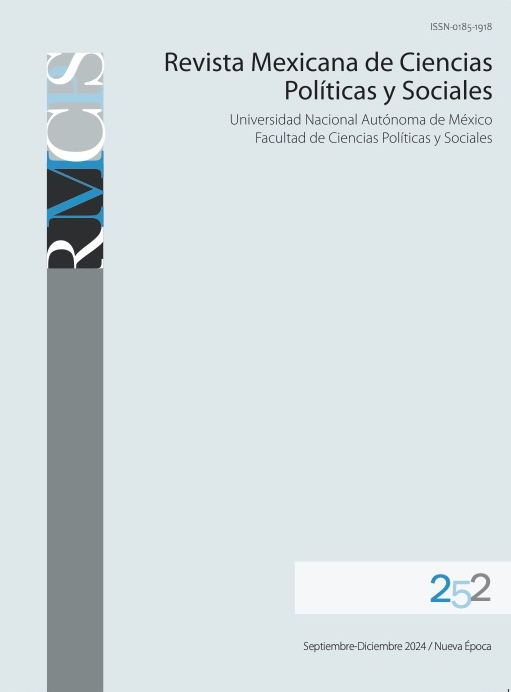The Triad People-Elite-Leader: Reflections on the Relationship Between Morality and Populist Discourse
Main Article Content
Abstract
The core of populist discourse involves simplifying the political landscape to a dichotomous struggle between the people as historical victims and the elite as corrupt and incorrigible. However, despite repeatedly emphasizing this difference in moral terms, little attention has been paid to the implications of using morality as a discursive referent or as an explanatory factor for how populist discourses so efficiently permeate the public space. This article analyzes the human being as a moral animal, retrieving Christian Smith's arguments, which will allow us to elucidate his approach to institutions as morally regulated enterprises, arguing its importance for the analysis of institutions such as democracy or phenomena such as populism. From this, the moral dimensions that interweave the people-elites-populist leader triad are identified, allowing us to understand how individuals receive, adhere to, and internalize the discourse and how this affects their decision-making and political participation.
Downloads
Article Details
Citas en Dimensions Service
References
Arato, Andrew (2015) “Political Theology and Populism” en De la Torre, Carlos (ed.) The promise and perils of populism: global perspectives. University Press of Kentucky, pp. 40-67.
Aslanidis, Paris (2016) “Is populism an ideology? A refutation and a new perspective” Political studies, 64(1): 88-104.
Barr, Robert (2019) “Populism as a political strategy” en De la Torre, Carlos (ed.) Routledge Handbook of Global Populism. Routledge, pp. 44-56.
Bokser Liwerant, Judit (2005) “Poder político y ética pública” Revista de la Facultad de Derecho, 52(237): 45-56.
Bokser Liwerant, Judit (2020) “Los territorios de la acción social colectiva: movimientos sociales, derechos humanos y democracia” Revista Mexicana de Ciencias Políticas y Sociales, 65(239): 15-23.
Bourdieu, Pierre (2023) Antropología económica. Curso en el Collège de France (1992-1993). Fondo de Cultura Económica.
Burbano de Lara, Felipe (2019) “Populist waves in Latin America” en De la Torre, Carlos (ed.) Routledge Handbook of Global Populism. Routledge, pp. 435-451.
De la Torre, Carlos (2015) “Introduction: Power to the People? Populism, Insurrections, Democratization” en De la Torre, Carlos (ed.) The promise and perils of populism: global perspectives. University Press of Kentucky, pp. 10-38.
Freeden, Michael (2003) Ideology: A very short introduction. Oxford University Press.
Hawkins, Kirk (2009) “Is Chávez populist? Measuring populist discourse in comparative perspective” Comparative political studies, 42(8): 1040-1067.
Hawkins, Kirk (2019) “The ideational approach” en De la Torre, Carlos (ed.) Routledge Handbook of Global Populism. Routledge, pp. 57-71.
Hawkins, Kirk y Cristóbal Rovira Kaltwasser (2017) “The ideational approach to populism” Latin American Research Review, 52(4): 513-528.
Laclau, Ernesto (2006) La razón populista. Fondo de Cultura Económica.
Lamont, Michèle (2010) “Introduction: The return of the moral” en Hitlin, Steven y Stephen Vaisey (eds.) Handbook of The Sociology of Morality. Springer, pp. v-vii.
Mudde, Cas (2004) “The populist zeitgeist” Government and opposition, 39(4): 541-563.
Mudde, Cas (2007) Radical right populist parties in Europe. Cambridge University Press.
Mudde, Cas y Cristóbal Rovira Kaltwasser (2017) Populism: A Very Short Introduction. Oxford University Press.
Ochoa Espejo, Paulina (2015) “Power to Whom? The People between Procedure and Populism” en De la Torre, Carlos (ed.) The promise and perils of populism: global perspectives. University Press of Kentucky, pp. 68-100.
Peruzzoti, Enrique (2019) “Laclau’s theory of populism” en De la Torre, Carlos (ed.) Routledge Handbook of Global Populism. Routledge, pp. 33-43.
Roberts, Kenneth (2015) “Populism, Political Mobilizations, and Crises of Political Representation” en De la Torre, Carlos (ed.) The promise and perils of populism: global perspectives. University Press of Kentucky, pp. 152-171.
Salmorán Villar, Guadalupe (2021) Populismo. Historia y geografía de un concepto. Instituto de Investigaciones Jurídicas, unam.
Scanlon, Thomas (2000) What we owe to each other. Harvard University Press.
Schroeder, Ralph (2020) “The Dangerous Myth of Populism as a Thin Ideology” Populism, 3(1), 13-28.
Smith, Christian (2003) Moral, believing animals: Human personhood and culture. Oxford University Press.
Taylor, Charles (1985) Human Agency and Language. Cambridge University Press.
Urbinati, Nadia (2019) “Antiestablishment and the substitution of the whole with one of its parts” en De la Torre, Carlos (ed.) Routledge Handbook of Global Populism. Routledge, pp. 77-97.

La Revista Mexicana de Ciencias Políticas y Sociales publicada por la Universidad Nacional Autónoma de México se distribuye bajo una Licencia Creative Commons Atribución-NoComercial-SinDerivar 4.0 Internacional.
Basada en una obra en http://www.revistas.unam.mx/index.php/rmcpys/
La RMCPyS autoriza a sus colaboradores que suban una copia de sus trabajos publicados en sus webs personales o en cualquier repositorio de acceso abierto, siempre y cuando se mencione específicamente a la Revista Mexicana de Ciencias Políticas y Sociales como fuente original de procedencia, citando el año y número del ejemplar respectivo y añadiendo el enlace a la página web donde este órgano editorial puede ser consultado in toto, de manera abierta y gratuita en: <www.revistas.unam.mx/index.php/rmcpys>.
Las y los lectores tienen libertad para:
Compartir, copiar y redistribuir el material en cualquier medio o formato.
El licenciante no puede revocar estas libertades en tanto usted siga los términos de la licencia.
De acuerdo con los siguientes términos:
- Atribución: la/el lector/a debe reconocer el crédito de una obra de manera adecuada, proporcionar un enlace a la licencia, e indicar si se han realizado cambios. Puede hacerlo en cualquier forma razonable, pero no de forma tal que sugiera que tiene el apoyo del licenciante o lo recibe por el uso que hace.
- No comercial: la/el lector/a no puede hacer uso del material con fines comerciales.
- Si se mezcla, transforma o se desarrolla a partir de la obra licenciada, no se permite la distribución del material modificado.
Cargos por gestión de artículos
La Revista Mexicana de Ciencias Políticas y Sociales NO cobra tarifas por recibir, procesar o publicar los artículos (Article Processing Charge [APC]) enviados por los autores.

